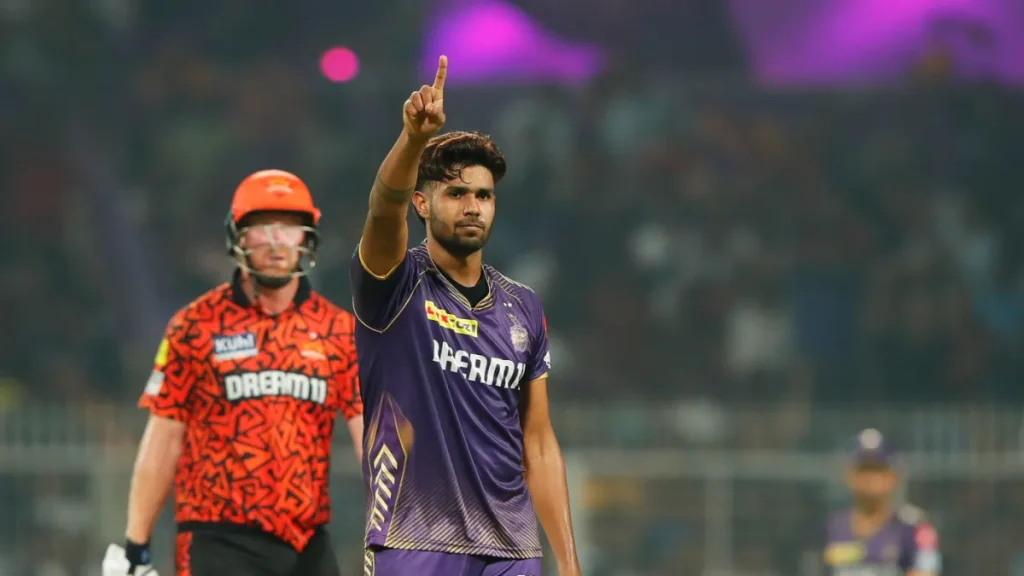
A soft-spoken Harshit Rana requested this writer while taking an interview at the Chinnaswamy stadium: “Can we sit on the grass and talk?” He had just bowled at full tilt for seven overs in a Duleep Trophy game. From round the wicket, Rana had mostly banged the ball on back of a length or it was short. It was interesting to note that Rana got more bounce than his teammate, Baltej Singh, who in turn has also gained a reputation for hitting the bat hard on impact in domestic cricket.
Although the opposition was weak – North-East Zone, it would have taken a lot of effort for Rana to bowl in that fashion in very good conditions for batting. So, understandably, he was feeling a touch tired. Rana had then said to RevSportz: “I did that (bowling bumpers from round the wicket) as it was the third day and the last session, and there was nothing in the wicket. All we can do is try, and that was the mindset. So, I bowled bouncers, and I got the wicket.”
It is true that by then Rana had already showcased his weaponry. He bagged a seven-for against Hyderabad in the 2022-23 Ranji Trophy. He followed that up by shining brightly in a couple of IPL games. But while watching him extract disconcerting bounce against North-East Zone, one could collect ample evidence of his skill set.
The nuts and bolts of Rana’s seven-over burst in the Duleep Trophy were on show when Kolkata Knight Riders took on Sunrisers Hyderabad at Eden Gardens. When Mayank Agarwal attempted to pull, he could only spoon a catch to the fielder stationed at deep backward square leg. The speed-gun indicated it was bowled at 128.1 kph. The salient feature of that delivery was Rana had pounded the deck hard and hit Agarwal’s bat high up on the splice. His bat also turned in his hands due to the impact of the short ball.
The next delivery to Rahul Tripathi was more than a yard quicker. Rana also bowled the short-of-a-length-delivery with an inward angle, and the batter had little chance of swaying away from the line. The outcome of that offering was that it clonked the helmet grille. The brief description of Rana’s first two overs reconfirmed the fact that he is a bowler of promise. You still pondered whether he had the mindset to execute his plans in the cauldron of end-overs-bowling.
In about an hour’s time, he passed that test too with aplomb. Mitchell Starc, Rana’s senior teammate, had just been carted around for 26 runs. He was up against Heinrich Klaasen, a cricketer at the peak of his prowess. The first ball he bowled to Klaasen in that over was effortlessly pulled into the stands. Seven needed off just five deliveries and with Klaasen still at the crease. At that moment, KKR’s goose looked cooked.
Rana, though, scripted his own destiny by dismissing both Klaasen and Shahbaz Ahmed. And SRH could only eke out two more runs. Rana was suddenly the toast of his teammates as he sent the fans at Eden Gardens into a tizzy. The keynote of that last over was how he broke it down into simple things and concentrated on the very next ball he bowled. He somehow found an erase button in his mind to forget the previous outcome.
It isn’t the first time that Rana has traversed through a tricky situation or phase. If you spool back to the same Delhi-Hyderabad Ranji game from last year, he had to wait for a considerable period of time before bagging his first wicket of the match, but Rana’s unwavering spirit kept him going. Eventually, he was rewarded.
“Not talking about the seven wickets that I took in the second innings,” said Rana, back when we spoke. “But the previous innings, when I took three wickets, I had picked up my first wicket (S Lokesh) in the 12th or 13th over. I mean, it took a long time to pick up the wicket.”
Rana had a dream to bowl fast when he was around 12 years old. His father turned out to be his pillar of strength. Just over a decade later, he is reaping the benefits for the foundation structure that was laid out during his formative years. “My father (Pradeep Rana) played a big role in my career,” he said. “He was the one who got it started.
“Father used to wake me up at 4.30 AM and take me to training. Even if I didn’t want to, he used to wake me up. My school bus used to come at 7.30. From school, I had to travel 1 hour and 45 minutes for practice. My father used to come to school with his vehicle, take me to practice and return (back home).”
All those miles have made the subsequent journey all the more rewarding.
A charged atmosphere at Eden Gardens as #KKR fans gear up for their opening clash against #SRH!
Fans wish welcome back to Rishabh Pant – “we’re excited to see him return to the IPL spotlight.”#IPL2024 #Cricket #EdenGardensRoar #KKRvSRH @AgeasFederal @CricSubhayan @debasissen… pic.twitter.com/ptzfTBE9fJ
— RevSportz (@RevSportz) March 23, 2024